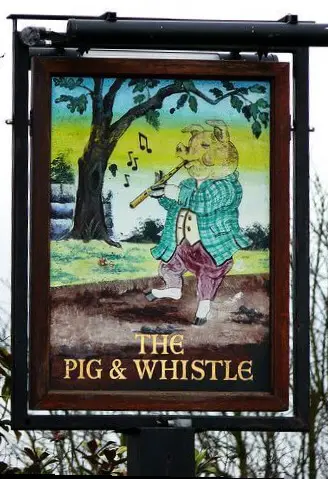A popular name for British pubs.
Pig and whistle
What's the meaning of the phrase 'Pig and whistle'?
What's the origin of the phrase 'Pig and whistle'?
The ‘Pig and Whistle’ is an archetypal pub name and is as likely to crop up in Olde England costume dramas as are men in tights and buxom serving wenches. There are several authentic old ‘Pig and Whistle’ pubs in the UK, but the name was in re328ality never commonplace. Dunkling and Wright’s Wordsworth Dictionary of Pub Names, 1994, estimated that there were just 10 pubs of that name in the UK in the 1980s. That was before the opening of the many theme pubs and restaurants throughout the world that have appropriated the name.
Like many old pubs names, for example ‘The Dog and Duck’, ‘The Goat and Compasses’, the derivation of ‘The Pig and Whistle’ is uncertain. There are several suggested origins. Most of these propose that the ‘pig’ part of the name derives from the name of a drinking vessel or container. The names given are variously, ‘peg’ (a set of pins fixed at intervals in a drinking vessel), ‘piggin’ (a wooden drinking vessel or ladle), although most seem to have missed the rather more obvious ‘pig’ (an earthenware pot or pitcher).
The ‘whistle’ element is harder to pin down. ‘Wassail’ has been suggested. This is the salutation used in toasting a person’s health – the reply being ‘drink-hail’. Wassail is also the name of the spiced ale that was drunk on Twelfth-night and Shakespeare referred to this in Macbeth, 1605:
Will I with wine and wassail so convince
That memory, the warder of the brain
Another suggestion, and this one positively reeks of folk-etymology, is a story that servant were obliged to whistle when they were sent to the cellars for pigs of beer, to prove that they weren’t drinking the stock. That may be true – and pigs might fly.
There is a completely different explanation, which seems to be better substantiated than any of the above. The term ‘pigs and whistles’ was in common usage as early as the 1600s, meaning fragments; odds and ends; trivia. An example of this is found in Samuel Colvil’s Mock Poem, Or, Whiggs Supplication, 1681:
How he did visit Bedlam fool-men,
And disputed with Gresham-School-men;
Discoursing of their Pigs and Whistles,
And strange experiments of Musscls,
Of Resurections of Ratts,
And of the Language us’d by Catts,
When in the night they go a Cating,
And fall a scolding and a prating:
To go to pigs and whistles was to fall into ruin. This was used in the Scottish poem Har’st Rig, in 1794:
“For he to pygs and whistles went, And left the land.”
If the ‘Pig and Whistle’ was a known pub name prior to the 1700s, then the ‘wassail’ version is still worth considering. That appears to be unlikely. Dunkling and Wright refer to survey by Lilleywhite of 17,000 London pub signs in the 19th century who was unable to find a single example of Pig and Whistle. The ‘going to rack and ruin’ meaning seems to have the best claim to be the source of the name.
Other ‘pig’ phrases:
Pig’s back – on the
(In a) pig’s eye
The history of “Pig and whistle” in printed materials
Trend of pig and whistle in printed material over time
Related phrases and meanings
Browse more Phrases
About the Author

Phrases & Meanings
A-Z
A B C D E F G H I J K L M N O P Q R S T UV W XYZ
Categories
American Animals Australian Bible Body Colour Conflict Death Devil Dogs Emotions Euphemism Family Fashion Food French Horses ‘Jack’ Luck Money Military Music Names Nature Nautical Numbers Politics Religion Shakespeare Stupidity Entertainment Weather Women Work
How did we do?
Have you spotted something that needs updated on this page? We review all feedback we receive to ensure that we provide the most accurate and up to date information on phrases.
